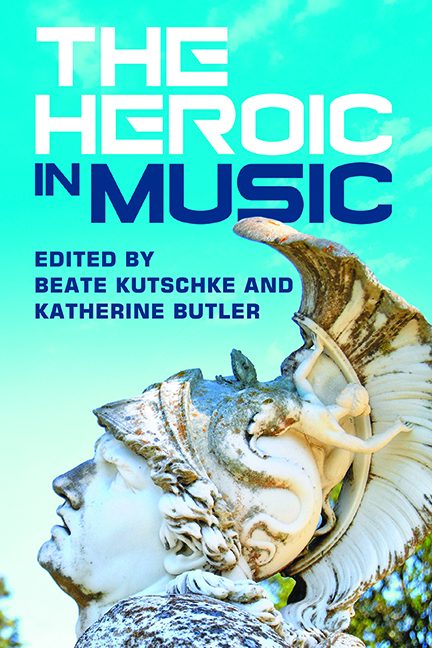Book contents
- Frontmatter
- Contents
- List of Illustrations
- Notes on Contributors
- Introduction
- Part I The Configuration of Heroic Music as a Tool for Shaping Moral and Political Identity
- Part II Music, its Ethics and Politics – Beyond ‘Beethoven Hero’
- Part III Heroic Music and its Moralities in Dictatorships and Post-Heroic Democracies
- Bibliography
- Index
6 - Tonal Relationships and Spiritual Heroism in Beethoven’s Late Style
Published online by Cambridge University Press: 16 July 2022
- Frontmatter
- Contents
- List of Illustrations
- Notes on Contributors
- Introduction
- Part I The Configuration of Heroic Music as a Tool for Shaping Moral and Political Identity
- Part II Music, its Ethics and Politics – Beyond ‘Beethoven Hero’
- Part III Heroic Music and its Moralities in Dictatorships and Post-Heroic Democracies
- Bibliography
- Index
Summary
In 1815 Beethoven wrote in his Tagebuch: ‘Will you practice resignation and renunciation? You are a hero – You are ten times more, a real man!’ The inscription, part of a lengthy quotation from Zacharias Werner's dramatic poem Die Söhne des Thal's (1803), stands in a contradictory relationship with the more active ideals typically attributed to heroism in Beethoven. Werner's hero does not rebel against circumstances nor ‘seize fate by the throat’. Instead, his exaltation of surrender challenges the very notion of struggle, which lies at the core of a critical discourse on heroism largely based on the per aspera ad astra paradigm. Heroism is frequently conceived in active terms: values such as restlessness and defiance characterize a dynamic type of hero, an agent in play with the power to transform reality and overcome obstacles. As critics have often noted, this kind of character resonates strongly with the struggling musical persona projected into a handful of works from Beethoven's middle period. Yet heroism comes in many flavours. For example, in the realm of religion, heroic virtues can be passive and inward oriented. In a study devoted to arguments against the ‘wide-spread feeling’ that the ‘Christian ideal lacks force’, theologian John C. Adams asserts:
The passive virtues are not merely negative traits… It costs as much to bear the pressure of adversity and the inertia of sluggish evils as it does to encounter and to overthrow them by assault… The strength which bears down opposition, which upsets and resists and encroaches and carries by storm, must be supplemented by the strength which can control self, endure, submit, concede, and bide the turning of the tide.
Although these observations are removed from Beethoven's context, they make explicit a distinction between passive and active heroism whose musical consequences remain underexplored. Werner, who was a renowned preacher, relies on a Christian concept of the hero built on passive virtues such as self-abnegation – a notion that Beethoven seems to have found compelling.
This chapter focuses on what I call spiritual heroism, a particular conception of the heroic that departs from the prevailing struggling-overcoming type.
- Type
- Chapter
- Information
- The Heroic in Music , pp. 110 - 128Publisher: Boydell & BrewerPrint publication year: 2022



